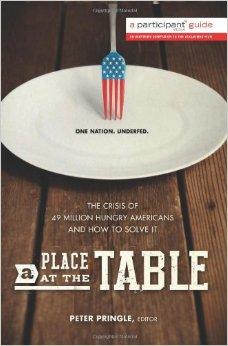Gespeichert von literature am

A Place at the Table is a documentary that follows the lives of several Americans as they struggle with food insecurity. The topic of hunger in the United States has been lingering since the late 1950s. However, the amount of people who go hungry or who have food insecurity (i.e. do not know where their next meal will come from) has drastically risen each year, mostly affecting children, single parents, and the elderly. In 2012, 50 million Americans were food insecure.
This documentary presents the struggle the government, along with lay citizens have when it comes to government assistance for the public. Three people are followed throughout the documentary, including Barbie, a single mother raising two small children in urban Philadelphia; Rosie, a fourth grade girl whose family struggles to find work and food; and Tremonica, a second grader from Mississippi who struggles with health problems because of her rural location and her families lack of work and money.
The moral debate that can be had about such a topic is how we can let our children go hungry. In the United States, the amount of money that is given by the government to public schools to fund school lunches is less than $3 a day, and only 90 cents of those $3 actually go toward food. In many cases, children in the U.S. will only once a day and that meal is usually at school. In Rosie’s case and in many cases of children in public schools, not getting the nutrition one needs per day causes a child to not focus, to feel sleepy, and ultimately to perform poorly on assignments. In this way, the hunger crisis in the United States affects children now and it affects the future citizens of America.
On the other hand, the topic of public assistance by the government is discussed in A Place at the Table. Barbie, the single mother from Philly, must take assistance from the government in order to raise her children, even though the amount of money she receives per month is not enough to sustain a healthy lifestyle. In the film, she travels with other single mothers who are stuck in similar situations to congress to advocate for better regulations when it comes to who can receive government assistance and those who cannot.
Overall, she finds herself stuck back in the same cycle of receiving government assistance, then finding a job, losing government assistance, and going hungry. Although taking initiative helps, no real solutions can be achieved unless those in charge are convinced through a large amount of advocates for better funding when it comes to school meals and regulations for welfare.
In the case of Tremonica, she struggles with childhood obesity and serious health issues can be traced which all back to the issue of funding for school lunches, lack of government assistance, and her location in the United States. These issues not only effect personal success like it does for Rosie and Barbie, but so personal health. Morally, the responsibility of making sure a child like Tremonica maintains a certain healthy lifestyle is on the parent, as well as on the lawmakers who pass low taxes and low standards when it comes to junk food.
The cause for the distance between how the government treats hunger in the U.S. and how those who are hungry few their situations is based around political powers within the FDA. Major food corporations who produce food that is unhealthy and harmful have taken over the food industry while those who produce fresh fruit and vegetables struggle to sell their produce to the general public due to size. Therefore, healthy, nutritious food costs more than junk food making it nearly impossible for those with low incomes to buy good food for themselves and their families. Although these companies who produce unhealthy food grow larger and larger in a corporate, capitalist society, their morals, along with those in political office, do not see the personal issues that are occurring in 30% of American life.


